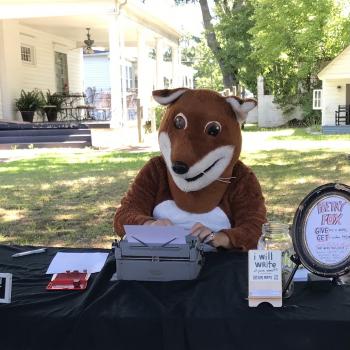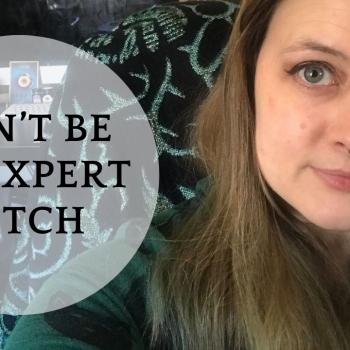I’ve got a rowdy band of outer court students hanging around my house a lot these days, so I find myself revisiting old questions, early histories, protocol that I’ve been taking for granted for too long, and reexamining jargon. It’s a good exercise for me. In my education program, this is part of what we call the “expert blind spot.” Basically, you do something for long enough, and you start to forget what it’s like to be a beginner. You start making assumptions about what people do and don’t know (which is frustrating for everyone). If you’re not careful, you can mistake a simple lack of experience for something like willful stupidity. Sincere questions can feel like mocking impositions.

I’m constantly checking myself and asking my working partner whether or not I’m being reasonable about my feelings, my reactions, and the words that sometimes pour forth unmitigated.
I’m often guilty of failing to acknowledge and work around my expert blind spot.
But when my students don’t know something I think is critical, that’s ultimately my responsibility. I don’t get to be irritated at them for failing to read my mind and automatically sharing my opinion about what’s important and obvious (rather, I can be mad, but I’m being unreasonable if I then take it out on a student).
When I read about teacher burnout in the Craft, I think a lot about the expert blind spot.
I understand that the student has responsibilities, and also that some people are just bad students. But sometimes I think part of the problem of teacher burnout lies in our own assumptions about what students do and don’t already know.
Just in my own short life as a witch, I’ve seen the emphasis shift from books to the Internet. I’ve seen trends in protocol and practice come and go. I’ve watched eclectic styles of Wicca go from being disparaged to being the norm. I’ve watched the ensuing backlash from other kinds of witches, and the subsequent rise of “secular” witchcraft, consciously “non-Wiccan” witchcraft, and about a zillion forms of what’s popularly called “traditional” witchcraft. I’ve watched traditional Wiccans respond in turn. And in between all this, I’ve participated in other Pagan communities, making additional observations and engaging in wider trends there. A lot has changed in only the last ten years, and I have trouble negotiating that change sometimes. I can only imagine what it must be like for someone who’s been at this for forty years. Or sixty years.
When I was first exploring Wicca, the landscape was very different. Seekers tended to read the same books, and, consequently, to be working with the same information. Now, that’s not always the case.
Everyone’s reading different websites, choosing from thousands of books, embroiled in different controversies, and has different expectations. There isn’t really a norm that I can pin down as easily. There’s no class average I can teach to.
Even though I know this, I still sometimes find that my expectations are stuck in 2002. Increasingly, I’m meeting would-be Wiccans who don’t know who Doreen Valiente is. They’ve never heard of the debates surrounding Silver RavenWolf, nevermind Ray Buckland, Alex Sanders, Lady Sheba, Robert Cochrane, or about a hundred other people I think are absolutely critical. They don’t know how to approach a traditional coven because that’s not a subject that gets covered in 101 books anymore. They may not even know that traditional covens are even an option anymore. They have no framework for approaching a teacher respectfully because teachers aren’t an assumed part of the process anymore. They don’t know how to be grateful or why they should appreciate the efforts of their teachers because they don’t have context for the cost of the teacher’s experience.
It’s astounding what people don’t know. Sometimes, it pisses me off a little. I went to the effort to learn all those things when I was a seeker, after all. And if I can do it, then surely they can, too! Right? RIGHT?
But I think it’s a mistake to take this not-knowing and just write it off as laziness, lack of interest, willful ignorance, or disrespect. I have to consciously step back and respect that the questions, concerns, and expectations of a newbie who learned about Wicca on Tumblr are necessarily going to be distinct from those of a newbie who learned about Wicca in 1998 by reading Scott Cunningham. And those are going to be even further removed from the experiences of someone who learned about Wicca through a Pagan Way group. Or through a student group at Berkeley. Or from reading a battered Gerald Gardner paperback in New York City. Everything about the process has changed, and so has the landscape.
Is it always for the better? No, of course not. But we still have to work with what we have. I find it useful to consciously appreciate the different environment surrounding seekers today than even ten years ago. It keeps my blind spot in check and quells a lot of the irritation. I’ve also found that when I speak openly with students about these changes, they’re usually appreciative, and my own reactions make more sense. They’re willing to meet my expectations, once I make them clear and give them historical context.
I’ve only been running a formal coven for a couple of years (though I’ve run plenty of reading groups, taught plenty of one-time classes, and organized plenty of open events). There’s a certain amount of newbie enthusiasm and optimism that carries me through the ensuing challenges. It still takes a lot to exasperate me, because I’m still in love with the novelty of the experience. The idealist in me hopes that I always will be in love with this process, but I’m not so naïve as to believe that that’s likely. I’ve had enough teachers to know that burnout is part of the package. Everyone needs a break sometimes, even if it’s only temporary. But teacher burnout isn’t just the result of unappreciative students. And it isn’t only the responsibility of the student to remedy. Teachers have to understand that their students are coming in with completely different experiences. Even the jargon is different. And just like I have to read contemporary YA literature in order to teach English to high schoolers (and hope to reach them, at least), those who hope to teach a new generation of witches (of whatever variety) have to familiarize themselves with the contemporary climate. We also have to understand that that’s not the same as altering our priorities or lowering our standards.















